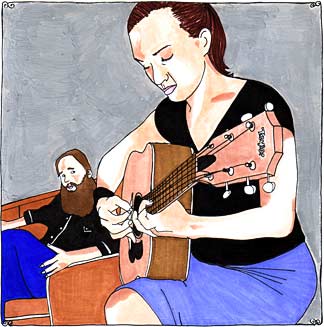- Jim’s Room
- Why Don’t You Stay Home
- Underground
- Lee
Lives and books are full of Svengalis, people who — usually for worse — take it upon themselves to control a performer, planting ideas into heads and exerting domination over a subject. They say it’s usually with an evil intent. The performer is a conduit for the pawning off of desire and free will from someone who can’t do so they teach and psychologically own in the end. The original Svengali, a character in George du Maurier’s 1894 classic Trilby, is illustrated to look like Lenin with more of a mullet and a pointier black beard. He takes a young singer under his wing and turns her into a riot, first having her perform the same verse of an absurd nursery rhyme three consecutive times in front of an important and critical audience. He got her to that point by unteaching all of the vocal tricks and phrasings that Mother Nature had accidentally and naturally taught her. “And then he set himself to teach her — kindly and patiently at first, calling her sweet little pet names — his ‘Rose of Sharon,’ his ‘pearly of Pabylon,’ his ‘cazelle-eyed liddle Cherusalem skylark’ — and promised her that she should be the queen of the nightingales.” He starts that way with his pupil, building up the trust and the reliance and then becomes more of a brainwasher. Still, it worked on those around Trilby as well. The world was enthralled.
“Until la Svengali appeared, the world had only known apples…The best apples that can be, for sure — but still only apples.” He had given the world a singer that went beyond all measures and she believed that it was because of her teacher that she had any of these powers. “If she had spread a pair of large white wings and gracefully fluttered up to the roof and perched upon the chandelier, she could not have produced a greater sensation. The like of that voice has never been heard, nor ever will be again. A woman archangel might sing like that, or some enchanted princess out of a fairytale.” Eugene Landy — he was a Svengali to the nth degree when it came to his manipulation of Beach Boy impresario Brian Wilson. He was a real dick. Nina Nastasia’s boyfriend and musical corroborator Kennan Gudjonsson is not at all like Eugene Landy. He’s no Svengali. He’s a better man than that (yet still bearded) and Nastasia’s piercing and plaintive songs are dusted with what can only be described as magic — and not the garden variety either.
Gudjonsson does not perform with Nastasia live, but acts as her manager and best friend, contributing to her art after the lights have cooled and the crowds have dissipated. Serving her songwriting this way makes it difficult to know where everyone starts and ends and what we’re left with is Nastasia earning the distinction and reaping all of the credit. So we’ll give it to her — happily. It’s that voice anyway that has us riveted. Look up and down her MySpace page and you’ll see many gladly falling all over themselves to write things with pregnant pauses and phrases like, “And…that voice…” You know exactly what they’re referring to. It’s nebulous and enchanting, full of sorcery. Gudjonsson has nothing to do with that. She might as well be that archangel that du Maurier’s writing of in Trilby, just without the corruption and without the baggage. We’ll credit Nastasia with all of the drafty sobriety that fills the unspeakably luscious new album On Leaving, a specimen of what can come out of the singular notions that less is more and it’s what’s left unsaid that speaks louder than a lineup of Marshall stacks. Other artists go for the burst and the homerun. Nastasia favors living in the embers of the firework flares as they gently fall, cooling back toward the ground. Most of her naked songs retain a stiff upper lip. They are of unfortunate events, but they don’t quiver and they aren’t weak. They are glimpses of the aftermaths, not usually the catalyst or the event. When we get there, the chairs, the couch, the bed and the floors are cold and love or like is lukewarm. There’s an eerie sense that had you been there 10 minutes earlier, you would have caught it all — the swirling storm, the passion rooted in unexplainable logic and the turn of the back that put an end to what was once before. Lingering in the air is the burden of two people who desperately thought they wanted to be together, desperately thought they could be together and soon enough found that they’d measured wrong. The lid didn’t fit. Sometimes that means an ugly end and sometimes that just means an end without any tangible goodbye.
Nastasia was a personal favorite artist of the late John Peel, a man that’s been exponentially influential in the creation and spirit of this very site. She recorded for Peel on six different occasions, but there’s no doubt that the work she released on On Leaving would have leveled the famed DJ. He would have been made silly with the roughed up emotions that are so delicious when they’re not our own. It’s an album all about when things have changed, when people claim, “You’ve changed.” These are the real irreconcilable differences we hear so much about in divorce papers. These actually have validity. They aren’t just spoken as the easiest way to account for an illicit shag. These songs on this album are where you find yourself when the party’s over, when it’s picking up the pieces time.
